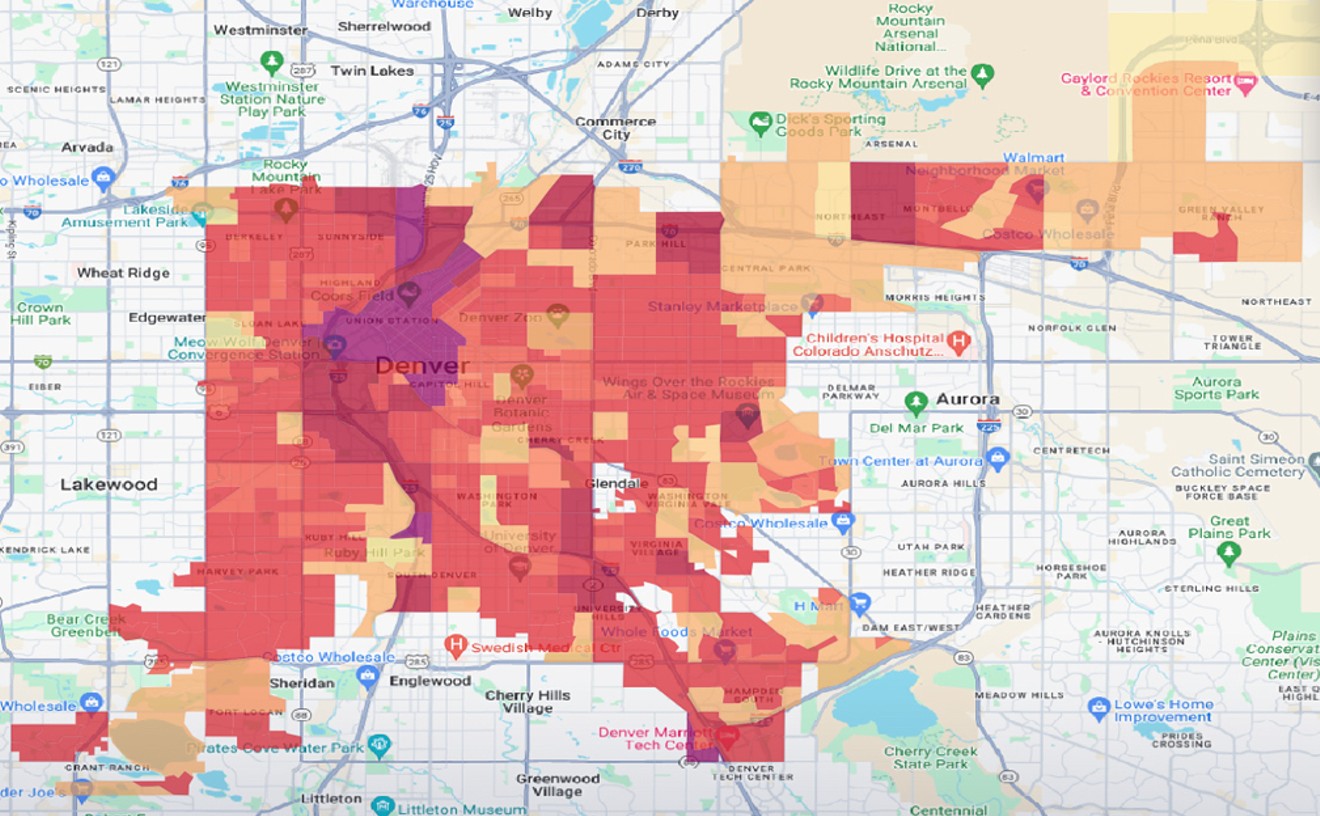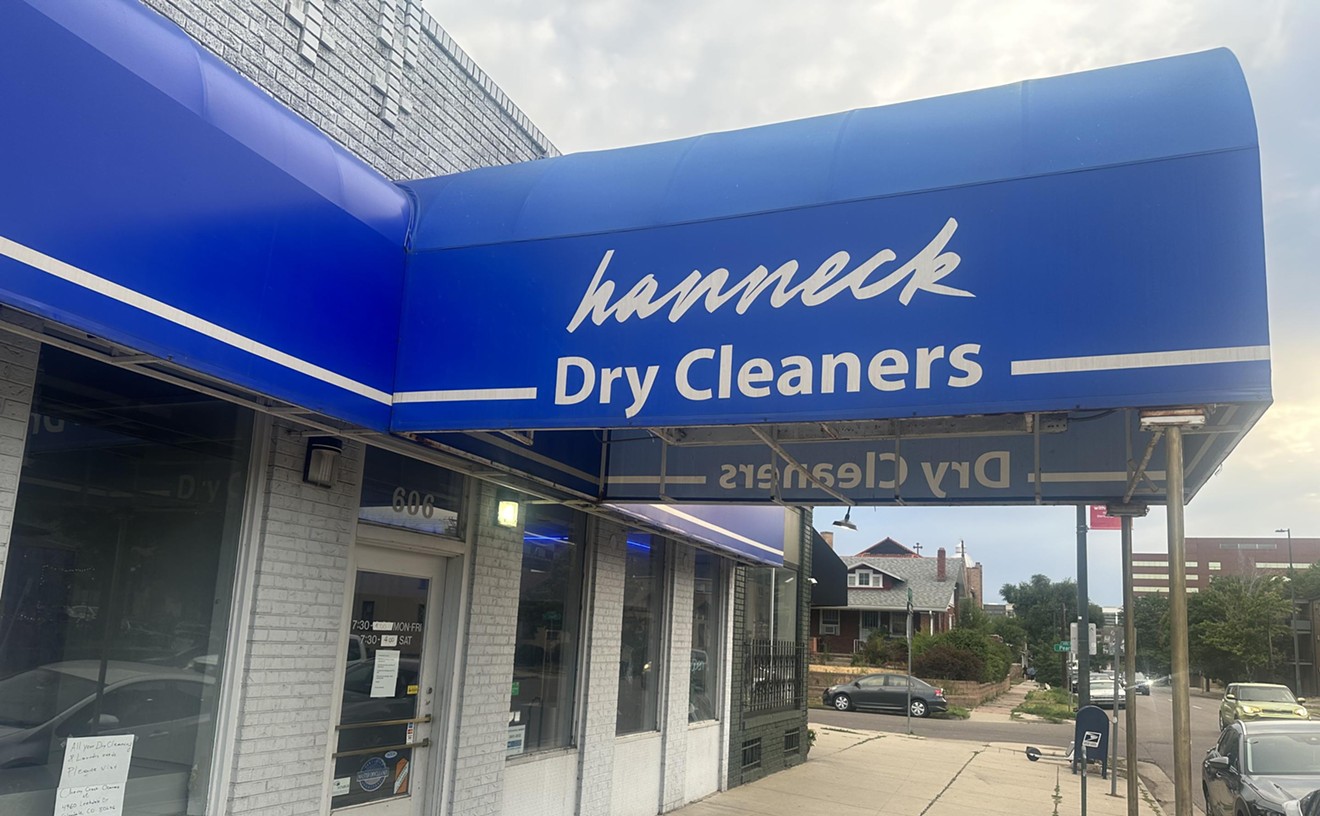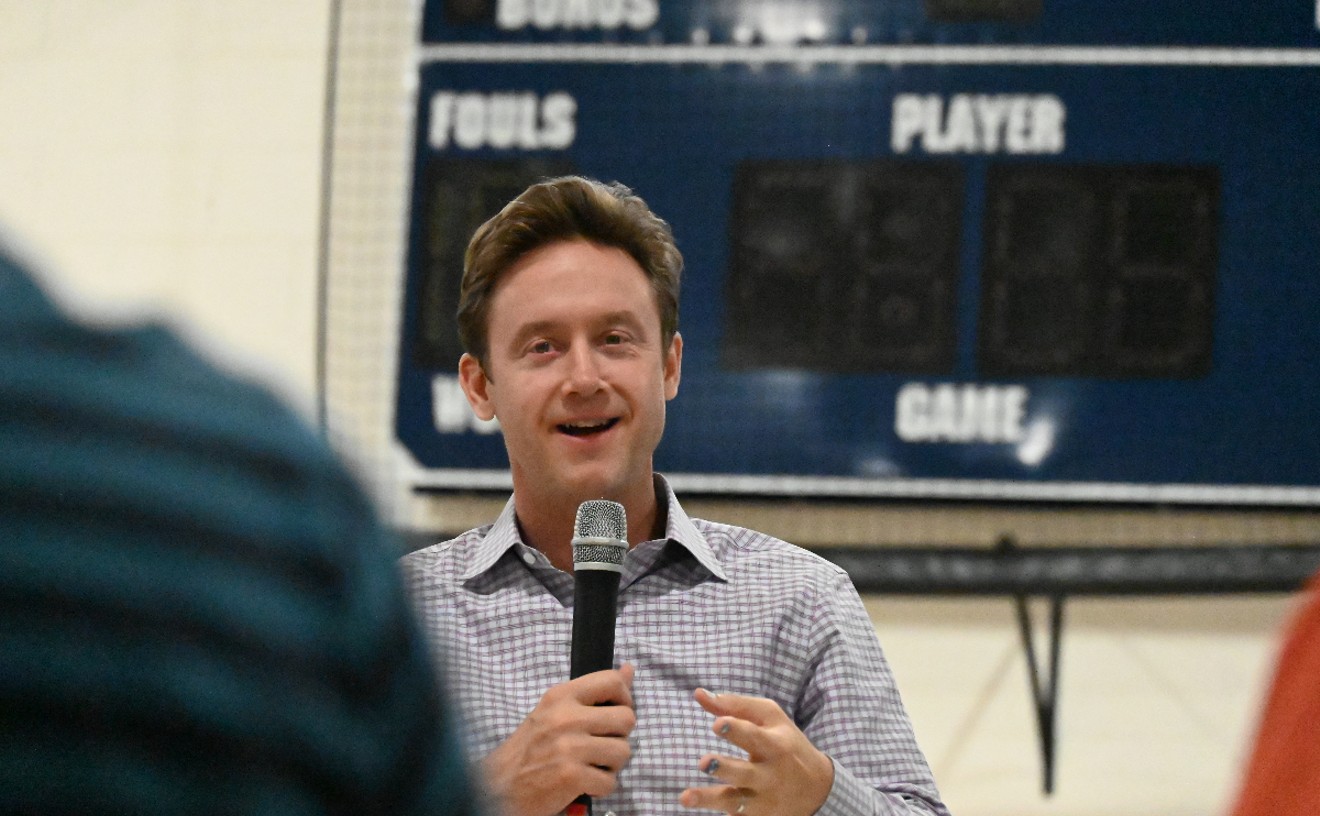Two days after Mayor Michael Hancock announced that homeless encampments in Denver "cannot persist" during his State of the City speech, the City of Denver, together with the Colorado State Patrol, launched an early-morning sweep of the large encampment in Lincoln Park in front of the Capitol.
At around 7 a.m. today, July 29, staffers with the Denver Department of Public Health and Environment and CSP troopers began fencing off the area, which is technically state property, and asking those staying in the park to leave. The block-long interior of Lincoln Park will be closed until further notice.
"This restriction is needed to allow for the immediate clearing, cleaning, assessment, and mitigation of public health and environmental risks to this heavily used area. The area restriction is temporary, and the park will re-open when abatement and clean-up measures have restored the park to a safe and stable state," says Ann Cecchine-Williams, deputy executive director for the DDPHE, in a statement on the action.
The encampment sweep is by far the largest taken by Denver since the COVID-19 pandemic began. Until now, the city has alternated between allowing encampments to stay in place, allowing them to return after a cleanup, and even fully dispersing others, none of which were as large as the Lincoln Park gathering.
Lincoln Park was the site of a major encampment early this year; on January 15, Denver declared it a public health hazard, cleared the park and did a major cleanup that involved taking down dead trees and dealing with a rat infestation. The park reopened on March 6, just as the state was beginning to deal with the coronavirus pandemic, but it remained fairly empty until June, when tents again started popping up.
On July 23, Governor Jared Polis said that he would welcome the removal of tents from Lincoln Park. That same day, Denver authorized state troopers to enforce certain city laws in the park, which paved the way for the sweep of the encampment. Late that afternoon, a triple shooting took place at 14th and Broadway, leaving one dead.
In the DDPHE statement, Cecchine-Williams cites "significant public and environmental health risks due to ongoing unsafe and unhealthy conditions" at the park. "Since last week, outreach workers and Denver Park Rangers have engaged those in the park, making them aware that a temporary closure of the area is imminent, and offering connections to services, shelter, and transportation. Under the circumstances, DDPHE determined that advance posting of the order would not be appropriate because of concerns around the recent escalating violence in encampments. The safety of all involved, including the general public, is our top priority."
Ironically, Tay Anderson, a Denver school board director and activist, was injured while protesting by the sweep. A Facebook live stream shows law enforcement officers trying to push back a crowd of protesters, including Anderson, who had gathered outside a recently set up fence. Police can be seen attempting to grab Anderson, and then the frame moves away. When it returns, Anderson is on the ground. While the video doesn't show how he landed there, Anderson, who went to the hospital after the incident, recently tweeted, "Today [Denver police] assaulted me, but I want us to remain focused on the reason why we were standing our ground and that is the immoral treatment of our unhoused neighbors."
Although the encampment in Lincoln Park was unsanitary, it wasn't a COVID-19 incubator.
The Centers for Disease Control and Prevention advises municipalities to avoid dispersing homeless encampments if housing is unavailable, out of fear of spreading COVID-19. The Colorado Coalition for the Homeless, Denver Public Health and the DDPHE recently wrapped up testing of homeless individuals in Denver. Of the 212 individuals tested in July, just seven were positive for COVID-19.
"In light of the sweep today, this data really seems to conflict with that action, because prevalence rates are really low, and moving people around increases harm and exposure to them," says Cathy Alderman of the Colorado Coalition for the Homeless. Of the 118 people tested at Lincoln Park, only two came up positive.
City officials have been trying to get those staying on the streets into shelters. In mid-August, a large auxiliary shelter for men at the National Western Center will close, but beds will open up at a temporary shelter in the Denver Coliseum, which is currently reserved for women. Service providers and city officials are working to find spots for the women staying at the Coliseum in motel rooms and other shelters.
Even though the city has empty shelter beds on any given night, however, many of those who are being dispersed from Lincoln Park will continue living outdoors by choice, and simply move their tents elsewhere in the city.
The city is also now supporting the efforts of service providers to set up temporary safe camping sites. While the Safe Outdoor Space plan calls for three sites, each of which could house up to sixty individuals, opposition from residents of the Globeville and Elyria-Swansea neighborhoods has put the status of the preferred first site, the parking lot outside the Denver Coliseum, in limbo.
This story has been updated to include the incident that sent Tay Anderson to the hospital; we'll update the post again after we hear from Anderson or the Denver Police Department.
[
{
"name": "Air - MediumRectangle - Inline Content - Mobile Display Size",
"component": "12017618",
"insertPoint": "2",
"requiredCountToDisplay": "2",
"watchElement": ".fdn-content-body",
"astAdList": [
{
"adType": "rectangle",
"displayTargets": "mobile"
}
]
},{
"name": "Editor Picks",
"component": "17242653",
"insertPoint": "4",
"requiredCountToDisplay": "1",
"watchElement": ".fdn-content-body",
"astAdList": [
{
"adType": "rectangle",
"displayTargets": "desktop|tablet"
},{
"adType": "rectangle",
"displayTargets": "desktop|tablet|mobile"
}
]
},{
"name": "Inline Links",
"component": "18838239",
"insertPoint": "8th",
"startingPoint": 8,
"requiredCountToDisplay": "7",
"maxInsertions": 25
},{
"name": "Air - MediumRectangle - Combo - Inline Content",
"component": "17261320",
"insertPoint": "8th",
"startingPoint": 8,
"requiredCountToDisplay": "7",
"maxInsertions": 25,
"watchElement": ".fdn-content-body",
"astAdList": [
{
"adType": "rectangle",
"displayTargets": "desktop|tablet"
},{
"adType": "rectangle",
"displayTargets": "desktop|tablet|mobile"
}
]
},{
"name": "Inline Links",
"component": "18838239",
"insertPoint": "8th",
"startingPoint": 12,
"requiredCountToDisplay": "11",
"maxInsertions": 25
},{
"name": "Air - Leaderboard Tower - Combo - Inline Content",
"component": "17261321",
"insertPoint": "8th",
"startingPoint": 12,
"requiredCountToDisplay": "11",
"maxInsertions": 25,
"watchElement": ".fdn-content-body",
"astAdList": [
{
"adType": "leaderboardInlineContent",
"displayTargets": "desktop|tablet"
},{
"adType": "tower",
"displayTargets": "mobile"
}
]
}
]












